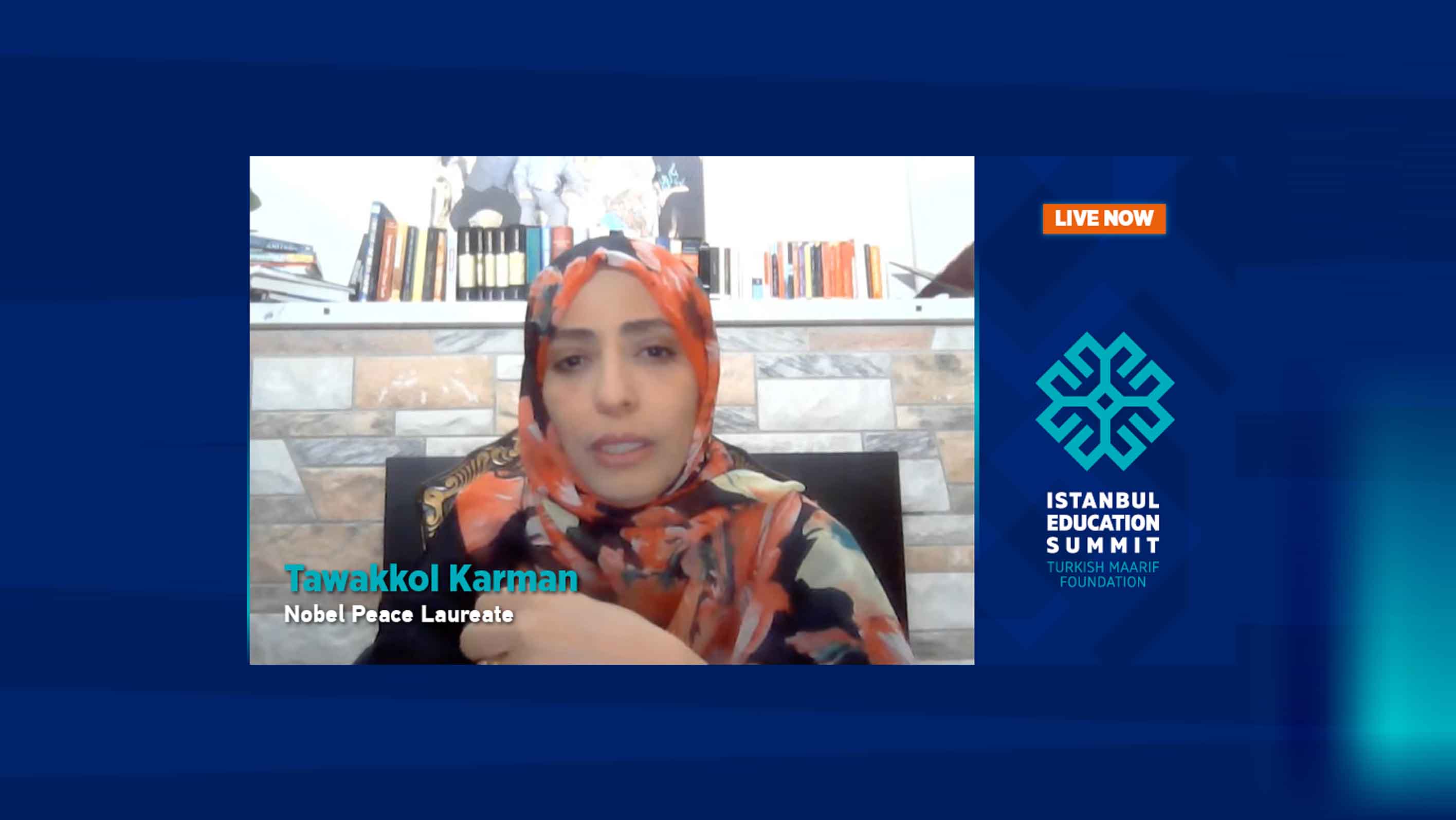
Tawakkol Karman's speech at the Istanbul Education Summit
Everything starts from education. I have always believed that education is a gateway to every development, every success, and every change.
In line with this, education plays a key role in development so that no one can speak of the latter in isolation from the former. A good education provides a solid foundation for development, progress and a decent life, and any separation between the two often yield bad outcomes.
In 2012, the Secretary-General of the United Nations appointed a 26-member High level Panel of Eminent Person, including me, to formulate new sustainable development goals. Co-chaired by UK Prime Minister David Cameron, the council also comprised prominent figures like former German President Koehler, Indonesian President Bambang, Liberian President Johnson Sirleaf, Queen Rania of Jordan, former Japanese Prime Minister Naoto Kan, Nelson Mandela's wife Gracia Machel, South Korean Foreign Minister Kim Song-Huan, Mexican Foreign Minister Patricia Espinosa, and other important and successful ones.
After extensive discussions, we identified 17 sustainable development goals, the fourth of which was quality education. We noted that since 2000, tremendous progress had been made in achieving the goal of universal primary education. In 2015, the total enrollment rate in developing regions reached 91 percent, accompanied by a drop of almost half in the worldwide number of out-of-school children. However, the growth in armed conflicts and other emergencies in several countries across the region, alongside with high poverty rates, led to significantly increasing the number of children out of school. We came to the conclusion that reaffirmed our conviction that inclusive and quality education for all is one of the most powerful and stable means of achieving sustainable development.
Education provides the knowledge necessary to make any change and progress, in addition to equipping individuals with skills needed for personal or collective achievements and providing an opportunity to accumulate experiences and qualification. Here, it becomes clear that the relationship between education and development is inseparable. António Guterres, the Secretary-General of the United Nations, believes that education is the key to personal development and to the future for societies, as it unleashes various opportunities and reduces inequalities. It is the cornerstone of enlightened and tolerant societies and the main driver of sustainable development.
For us to be able to achieve economic development and reduce poverty levels and eventually eliminate poverty, we have to have sufficient competencies in the fields of medicine, nursing, journalism, engineering and different disciplines. Education also helps us train individuals to acquire essential skills required in the labor market and life in general. Hence, governments worldwide work to pay great attention to investing in education and providing labor market training.
I would like to draw attention to an important aspect, usually not discussed enough, that is education can be invested in consolidating peace within countries experiencing multiple conflicts. Wars and conflicts have caused havoc in all aspects of life. Undoubtedly, development and the level of education have been affected as a result. So if we want to take development forward, it will be necessary to pay adequate attention on how people get education and how this can be utilized to bring about great economic and civilized development.
The Coronavirus epidemic has posed great challenges to education, which definitely has repercussions on development. Therefore, great efforts and work are needed to overcome the obstacles to the quality of education, as this is the beginning of the road to development. The education process has gone through hard times during the last two years, so it is necessary to think seriously about how to bridge that gab in order to avoid any repercussions on economy and development.
In this context, António Guterres, the Secretary-General of the United Nations, has pointed out that the multifaceted role of education is not limited to sustainability in its positive aspect but also it can promote unsustainable practices, including excessive consumption of resources, accelerated erosion of indigenous communities’ knowledge and their relatively sustainable ways of living. Therefore, education may need to be adapted and transformed to ensure its positive impact.
In my belief, education will have little impact on development if women are neglected. Unfortunately, despite significant progress as for women's education in many poor countries, wars and conflicts here and there have taken away the most basic right from them, namely education. The absence of women from the educational process will have a direct negative impact on development, as no society can achieve a renaissance without women being an active element.
An educated people who cares about the quality of education will be blessed with different potentials to do something important, while those who do not care about education will suffer economically, and almost become easy prey to hunger and poverty.
To do our part in this regard, we must strive to achieve quality education, as an important entry point to political and economic progress and development, as well as to bring about positive changes at the social level. We have to realize how the absence of quality education will make it difficult for us to bring about any change in living standards and or quality of life, be it regular education or vocational one that requires training and practical application.
Finally, I may have to say that many poor countries spend a large part of their money and national income to buy weapons, neglecting education and development, a thing that results in disastrous consequences.
I call on such countries to reverse these bad policies, direct their focus towards education and development as one package, and do their utmost to avoid wars and stay away from them.
